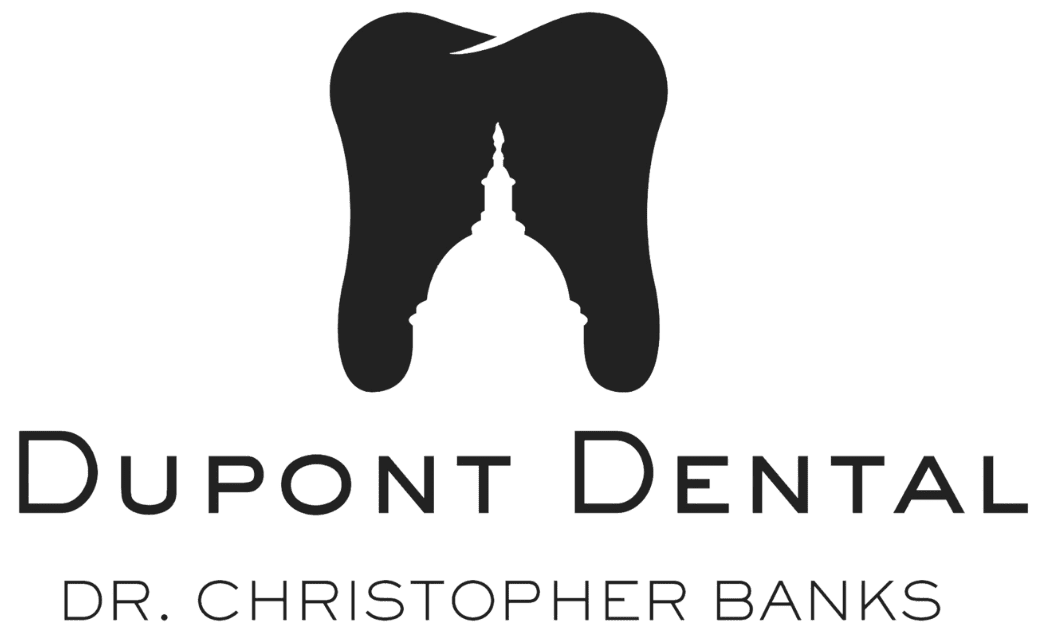Many patients who are interested in implant restorations may find the treatment daunting. Implants require dental surgery, where we insert the titanium implant anchors or posts into the jaw. While implants are durable, lasting restorations, patients may wonder if treatment is painful.
Here, we will review what to expect when you receive treatment with one or more dental implants in our Washington, DC, dental office and how we ensure your comfort when you visit.

Are Dental Implants in Washington, DC Painful?
We will numb the treated area with a local anesthetic during the implant procedure. This anesthetic ensures you will not feel any pain as we place the implants. We will insert one or more dental implants in our Washington, DC office.
Once the anesthetic wears off, you may feel discomfort as you heal. However, we will provide you with pain medication to take directly after your treatment and will recommend using an ice pack in fifteen-minute increments to minimize swelling.
We will also suggest a soft diet for several days following implant treatment to minimize sensitivity at the surgical sites. Pain will subside after one to two weeks.
Additionally, you will not feel any pain once your implants heal. When the implants are fully integrated, we will place the final restoration. It may take time to get accustomed to living with dental restorations, but they will not cause any pain or irritation.
You will only feel implant pain if you develop an infection. Please contact us if you notice irregular swelling or severe pain in the tissues surrounding your implant, as this is not normal.
A good oral hygiene routine and regular dental visits will prevent gum disease and tooth decay that can affect implants.
Living Comfortably With Dental Implants
Ultimately, patients who have lost permanent teeth due to an injury or decay will feel relieved from daily discomfort and pain once their implants have healed. Dental implants act as new tooth roots, allowing patients to bite and chew normally without uneven pressure or wear on the natural teeth in their mouth.
Patients will not feel any discomfort with their restorations if dental implants secure them. Sometimes, restorations like removable traditional dentures can irritate or inflame the gum tissue.
Removable dentures use adhesive to stay in place and can cause irritation and sores. Dental implants simply replace missing teeth at the root without uncomfortable shifting.
Frequently Asked Questions
What foods should I eat during the recovery period after implant placement?
Stick to soft, nutrient-rich foods during the first few days, such as yogurt, scrambled eggs, smoothies, applesauce, and mashed potatoes. Avoid anything crunchy, spicy, sticky, or too hot, as it could irritate the surgical site. Gradually reintroduce firmer foods as your healing improves. Staying hydrated and getting enough protein can also help speed up recovery.
How can I tell if my implant site is healing normally or if there’s a problem?
Normal healing includes mild swelling, tenderness, and slight bleeding for the first 24–48 hours. As healing continues, pain should lessen, and the gums should begin to look healthy. Warning signs of problems include persistent pain, excessive swelling, pus, bad breath, or a loose implant. If any of these occur, contact our office right away.
Is it normal to have swelling or mild bruising after implant surgery?
Yes, swelling and mild bruising around the cheeks or jaw are common after implant surgery. These symptoms usually peak within 48 hours and improve over the next few days. Applying a cold compress during the first 24 hours can help reduce swelling. If symptoms worsen or last beyond a week, let your provider know.
When will I receive my permanent restoration after the implant is placed?
The permanent crown, bridge, or denture is usually placed 3 to 6 months after implant placement. This gives the implant time to fuse with the bone through a process called osseointegration. Once Dr. Banks confirms the implant is stable, they’ll take impressions to design your final restoration. A temporary crown may be used during the healing phase if needed.
Will I feel pain after the anesthetic wears off following implant surgery?
Some discomfort is expected once the numbness fades, but it’s usually manageable with over-the-counter or prescribed pain relievers. Most patients describe it as soreness or mild throbbing rather than sharp pain. If the pain becomes intense or lasts longer than a few days, follow up with our office to rule out complications.
How long does the discomfort typically last after getting dental implants?
Most discomfort lasts about 2 to 3 days, with gradual improvement afterward. Swelling and tenderness may persist for up to a week. By the end of the first week, you should feel much better and be able to resume most normal activities. Persistent pain beyond 10 days could signal a problem and should be evaluated.
Are you interested in implant-secured restorations? Call Dupont Dental for an implant consultation today at (202) 946-4720.
You can also schedule a dental appointment with Dr. Christopher Banks online. If you have any questions for Dr. Banks about dental implants, please let him know. He will be happy to help you.
